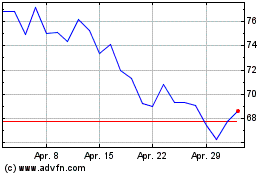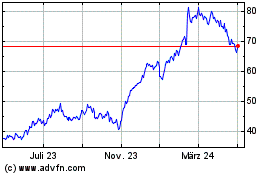Schlumberger Cuts 21,000 Jobs Amid Historic Oil Downturn -- Update
24 Juli 2020 - 4:29PM
Dow Jones News
By Collin Eaton
Schlumberger Ltd., the world's largest oil-field services
company, is cutting about 21,000 jobs as oil producers made steep
spending reductions in response to a historic drop in prices amid
the coronavirus pandemic.
Schlumberger recorded $3.7 billion in impairment charges in the
second quarter, including about $1 billion in severance charges
related to the job cuts, which represent roughly one-fifth of its
workforce, it said Friday.
"This has probably been the most challenging quarter in past
decades," Chief Executive Olivier Le Peuch said, noting its revenue
fell sharply because of an unprecedented fall in oil-field activity
in North America.
Schlumberger's sweeping job cuts are the latest example of how
companies are having to sharply tighten their belts and reduce
their workforces in the face of a historic drop in demand for their
products due to the pandemic.
From United Airlines Holdings Inc. and Boeing Co. to General
Electric Co. and Uber Technologies Inc., dozens of major companies
have announced they are laying off workers this year as they buckle
down in expectation of a prolonged slowdown.
Many companies have chosen to furlough rather than completely
sever ties with workers in hopes of bringing them back when
conditions improve. But as the effects of the pandemic drag on,
more companies may resort to letting workers go.
Energy companies have been particularly hard-hit. U.S. oil
prices dropped into negative territory for the first time in April
as demand for gasoline and jet fuel fell dramatically this spring
as people stopped traveling and governments imposed stay-at-home
restrictions.
The oil price crash prompted U.S. oil companies to dramatically
cut capital spending on drilling and fracking new wells, the
lifeblood of oil-field service companies such as Schlumberger and
rivals Halliburton Co. and Baker Hughes Co.
Earlier this week, Halliburton and Baker Hughes both reported
losses and declining revenue, with Halliburton estimating spending
by North American oil-field services customers will decline 50%
this year compared with 2019.
Schlumberger's Mr. Le Peuch said the company accelerated a plan
to restructure its North American business, shutting down scores of
facilities in a move to position itself "for a market of smaller
scale and lower growth outlook, but with higher returns."
He said oil demand is slowly returning to normal and is expected
to improve as governments lift restrictions in support of increased
consumption, paving the way for a modest increase in fracking
activity in North America.
"We expect the global decline to recede into a soft landing in
the coming months absent further negative impact from Covid-19 on
the economic recovery," Mr. Le Peuch said in a conference call
Friday.
As many as 55,000 of the company's employees are working
remotely, he said. Schlumberger has corporate offices in Paris,
Houston, London and The Hague.
Schlumberger reported a net loss of $3.4 billion, or $2.47 a
share, compared with net income of $492 million, or 35 cents a
share, in the same period last year. Revenue declined 35%
year-over-year to $5.4 billion, with North American sales down 58%
to about $1.2 billion.
Its earnings per share, excluding charges and credits, was 5
cents a share, compared with analysts' expectation of a loss of 1
cent per share, according to FactSet.
Schlumberger said it employed approximately 85,000 people as of
the end of the second quarter. It had said in the first quarter it
employed about 103,000.
Halliburton has also cut thousands of jobs, reporting Monday
that it had more than 40,000 employees as of the end of the second
quarter, down from about 55,000 at the end of the fourth quarter.
It didn't provide specific job-cut numbers.
"This was a difficult decision, but is a necessary action as we
work to successfully adapt to challenging market conditions,"
Halliburton spokeswoman Emily Mir said.
Last month, British oil giant BP PLC said it plans to cut nearly
10,000 jobs, or 14% of its workforce. U.S. oil major Chevron Corp.
said it expects to reduce its global workforce by 10% to 15% from
about 45,000. Most of the reductions will take place this year, the
company said.
Write to Collin Eaton at collin.eaton@wsj.com
(END) Dow Jones Newswires
July 24, 2020 10:14 ET (14:14 GMT)
Copyright (c) 2020 Dow Jones & Company, Inc.
Uber Technologies (NYSE:UBER)
Historical Stock Chart
Von Mär 2024 bis Apr 2024

Uber Technologies (NYSE:UBER)
Historical Stock Chart
Von Apr 2023 bis Apr 2024
